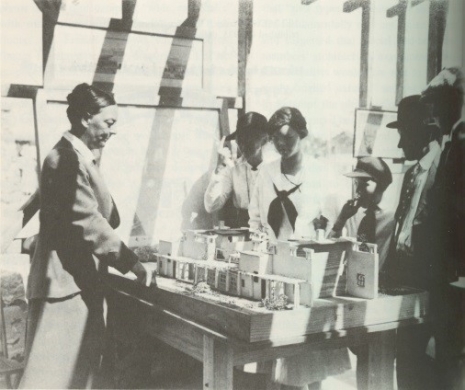
Alice Constance Austin showing her designs for the Llano del Rio community, 1916
If you say, “We’re going to build homes without kitchens, as a way of helping women break free of their socially inscribed roles,” most people today are going to react with wonderment or disbelief. But a century ago, the idea of removing kitchens from homes was a commonplace idea among feminist thinkers.
In the years just before the First World War, attorney Job Harriman invited white, union-affiliated, and socialist residents (yes, whites only) to join a utopian society he was planning for the Llano Del Rio socialist commune in what is today Llano, California, in Los Angeles County. A year later he asked feminist architect Alice Constance Austin to create living quarters for 900 new residents—in an effort to dream up a community without domestic labor, Austin came up with a radial design for the community in which none of the single-family homes had kitchens. Her dwellings placed a living room at one end and bedrooms at the other separated by a large “dining patio.” Her plans also included built-in furniture to reduce time wasted on dusting and sweeping.

This plan depicts Austin’s radial design for Llano Del Rio
The idea was that, in the words of Manisha Aggarwal-Schifellite, “kitchens would become centralized (as would laundry), and treated as part of the larger infrastructure of the community.” According to “Another Look at the Llano Del Rio Colony” (PDF) by John M. Foster and Alex Kirkish, “Llano del Rio planned single-family houses without kitchens. Members dined communally, balancing the privacy of bedroom and parlor against the required sociability of the dining room.”
The notion of homes without kitchens had been kicking around for quite a while. In 1888 Edward Bellamy’s socialist utopian novel Looking Backward, America in the year 2000 was to be a paradise with communal kitchens. Ten years later, in 1898, Charlotte Perkins Gilman wrote the following words in her treatise Women and Economics:
Take the kitchens out of the houses, and you leave rooms which are open to any form of arrangement and extension; and the occupancy of them does not mean “housekeeping.” In such living, personal character and taste would flower as never before. … The individual will learn to feel himself an integral part of the social structure, in close, direct, permanent connection with the needs and uses of society.
In her socialist city, Austin anticipated labor-saving devices in the home and an underground central laundry and kitchens where hired chefs and workers would relieve women “of the thankless and unending drudgery of an inconceivably stupid and inefficient system, by which her labors are confiscated.”
In her book The Grand Domestic Revolution: A History of Feminist Designs for American Homes, Neighborhoods, and Cities, Dolores Hayden wrote:
Each kitchenless house was to be connected to the central kitchen through a complex underground network of tunnels. Railway cars from the center of the city would bring cooked food, laundry, and other deliveries to connection points, or “hubs,” from which small electric cars could be dispatched to the basement of each house.
Note that in addition to banishing the household of drudgery, Austin was also trying to make the town center a more tranquil place by eliminating both individual automobile traffic and frequent retail purchases (not needed with frequent food and laundry deliveries).
Unfortunately, Austin’s visions were never constructed. The First World War came along, gobbling up resources, and by 1918 the Llano Del Rio commune was a dead letter. Too bad we never got to see these ideas in action.
Here’s Frank Black and the Catholics name-dropping “Utopia” and “mescaline” in the song “Llano Del Rio” off of 2001’s Dog in the Sand:
via Atlas Obscura